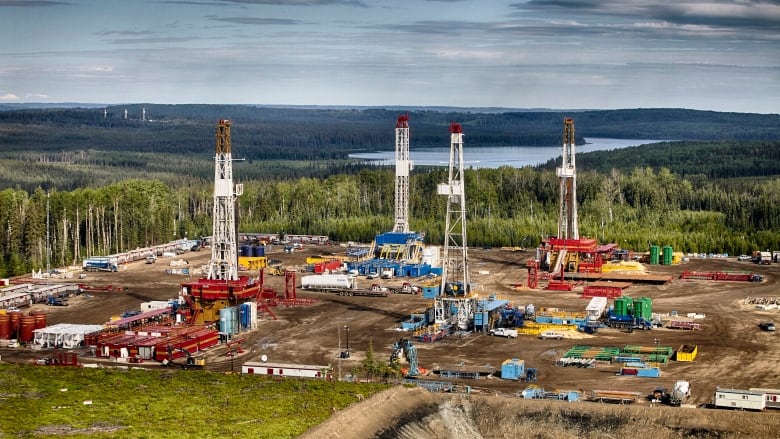N.W.T. set to revamp decades-old oil and gas laws
Oil and gas legislation in the territory a holdover from before 2014 devolution agreement

For the first time in decades, petroleum legislation in the Northwest Territories is getting a makeover.
In 2014, the territorial government inherited authority over its lands, minerals and onshore petroleum resources from the federal government. Rather than write new legislation, territorial leadersmirrored existing federal legislation, creatingthe Petroleum Resources Act and Oil and Gas Operations Act.
- PM announces final transfer of power deal for N.W.T.
- 5 things to know about devolution in the N.W.T.
The Petroleum Resources Actsets the rules around how a company can get permits toexplore for and produce oil on N.W.T.lands. The Oil and Gas Operations Act regulates what happensonce a company starts exploring for or producing oil and gas.
Rules regulating offshore oil and gas exploration and development remaina federal responsibility.
Onshore-specific rules
Over the next year, the territory's leaders plan to explore ways to streamline the laws and increase transparency. Specifically, the government is looking to:
- Create a more consistent and predictable regulatory system
- Create more transparency and public accountability
- Update the laws to reflect current risks, best practices and standards
- Increase the N.W.T.'s competitiveness in the global oil and gas market
This update is a great opportunity, according to energy analyst Doug Matthews, who is based in Calgary.
"The existing petroleum legislation which the [territorial government] had to inherit following devolution is really old stuff, dating back to the 70s and 80s," he said, adding part of the problem is it was developed with offshore development in mind.

"What you need for Hibernia [oil field] is not the same for what you need for say, Cameron Hills. So I think the government has a great chance here to develop an onshore specific petroleum regime."
A public document released by the territory last week states the proposed updates to the laws are just a first step and aren't intended to be "comprehensive."
"It is the first step in what will be a longer-term process of review designed to address the most immediate concerns identified since devolution."
What are those concerns?
"How to handle shale? That's going to become a big issue going forward,"Matthews said.
Shale-oil development, or fracking, is a method of blasting high-pressure water into rock to release the oil or gas inside.
Because fracking is a relatively new technology, current legislation doesn't address it Matthews says there is a great opportunity right now for that to change.
Pre-bid qualifications, differing lease terms
Matthews also suggested the government could write up "pre-bid qualifications" for known oil and gas reserves in the territory.
As it is right now, he said, companies bid on an exploration lease, and get a six-month period where they can negotiate with local or First Nation governments.
"If at the end of the six months they can't get along with the locals and their demands, the company can walk away from its bid," said Matthews.
Instead, he suggested the territorial government could work with Indigenous people and other residents to outlineexpectations and concerns before the bidding process takes place.
"It's not new thinking," he said."But anything much past 1912 is new thinking to Ottawa."
"It's an opportunity for the [territorial government]again to say, 'Hey we can do something different.'"
Matthews also suggested ways to update rules that allow companies to sit on areas deemed to be "significant discoveries," in perpetuity.
- Four oil and gas companies could get exclusive lifetime exploration rights in N.W.T.
- NEB and GNWT study finds 200 billion barrels of oil in the Sahtu
He explained the rules are currently written this way with offshore development in mind.
"A company could find, say in the Beaufort Sea for example ... a very good field. But there [is] no infrastructure whatsoever to get that product to market," he explained.
"A significant discovery licence that would essentially allow the company to keep the field, keep the licence, until such time it was economical [to develop]."
In the N.W.T., there are a number of onshore oil-and-gas-rich areas in the Sahtu and Dehcho regions that already exist near pipelines, making indefinite licenses unnecessary. Instead, Matthews suggested tailoring licence lengths for specific areas depending on their proximity to oil production infrastructure.
He suggests making licenses in the Gwich'in, Inuvialiuit and Sahturegions indeterminate, then 10 years in more established regions like Norman Wells and then only seven years in the Cameron Hills area near the N.W.T.'s border with Alberta.
What's next?
The territorial government will be travelling across the Northwest Territoriesthis spring, looking for public feedback. The government will be in Fort Simpson March 13, Fort Liard March 14, Norman Wells March 26, and Inuvik on March 27.
Then, the government plans todevelop draft amendments, consult with Indigenous governments over the course of the next year, and introduce the new rules to the legislative assembly in thesummer of 2019.












_(720p).jpg)


 OFFICIAL HD MUSIC VIDEO.jpg)
.jpg)



























































































